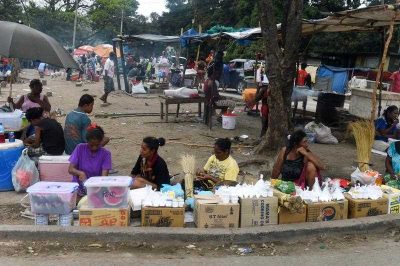By Busa Jeremiah Wenogo
On 19 October 2015 the Constitutional Law Reform Commission launched the draft report on the Review of the Informal Sector Development and Control (ISDC) Act of 2004 at the University of Papua New Guinea (PNG). The report contains a set of recommendations and a proposed bill to replace ISDC Act to be presented to the government for its consideration later in 2015. If passed, the proposed bill could transform PNG’s socio-economic landscape.
The report called for wide-ranging reforms in the areas of financial inclusion, research, policy and government’s functions, as well as budget reforms to better equip local level governments (LLGs) to administer the Act. If, as the report recommends, the informal economy is recognised as a ‘wealth distributive mechanism’ it could allow money generated in big impact projects, such as the PNG liquefied natural gas (LNG) project, to be transferred to the majority of the populous. And, if provided with the right environment, it could promote entrepreneurism and innovation.
Yet will the government ensure that the bright intentions of the law are realised? The sad reality is that implementation and enforcement have always been achallenge for the PNG government. Most LLGs in PNG are struggling to function effectively due to a lack of resources as well as a limited understanding of their functions and responsibilities. Since the reduction of the Service Improvement Grants for LLGs from K500,000 (about US$168,750) in the 2013–2014 budget to only K100,000 (about US$33,750) in 2015 budget, the ability of LLGs to deliver services has been severely handicapped. The situation is likely to remain the same or further deteriorate for the near future. To make matters worse, as referenced in the report, most LLGs that were consulted had no idea about the existence of the 2004 Act even though it was a national law.
The report also found that at the national level there was a lack of oversight, which enabled local administering authorities to make laws that did not align with the Informal Sector Development and Control Act 2004. This has led to some local laws beings contested in the courts.
To address this, the Department of Community Development and Religion has indicated it will dedicate a new section to coordinating the implementation of the policy and the law. Yet this may not yield any tangible results. The department itself is still reeling from a leadership tussle two years ago that has seen the department fragment into factions. In the aftermath of this battle most offices are still half-empty. And the Department has not shown any enthusiasm towards implementing the National Informal Economy Policy. In this environment there is no guarantee that the law will be implemented once it is passed.
Given that, within the informal economy, there are diverse sets of activities (some of which pose serious health and safety risks) the revised law must adequately control the growth of the informal economy to minimise its harmful effects. The informal economy law in its current form is consistent with this sentiment but has insufficient controls. The report recommends reinforcing this idea by raising penalties for informal economic businesses that negatively impact the environment, hygiene, health and safety as well as for those that sell addictive substances.
But the report fell short of proposing a mechanism to protect the rights of informal economy participants. There is no mention of the need to ‘properly organise’ informal economy participants, and their activities, to assist dialogue and consultation. Section 3(1) of the Informal Sector Development and Control Act 2004 allows the administering authority to consult with relevant ward committees, police and government agencies when declaring areas in which informal economy businesses could be conducted.
But there has been little consultation so far. This has been compounded by the fact that informal economy operators and vendors are disorganised. Given the complexity of the informal economy, provinces need to develop informal economy committees comprised of key stakeholders to deal with these issues.
The report also did not highlight the need for a proper restorative justice mechanism to be in place to deal with cases of harassment and abuse inflicted by enforcers on informal economy participants. The current Informal Sector Law is silent on this matter.
For most informal economy operators the Village Court is the most affordable, reliable and dependable arm of the justice system since it addresses individual and community legal concerns. As most vendors lack basic literacy skills and resources it can be difficult for them to navigate the formal legal system. Developing an informal economy market vendor association that represents their common interests could greatly assist such individuals. Such a grouping should also include those who are operating outside of formally recognised markets such as street vendors, peddlers and mobile traders. An interest group like this could better appeal to administering authorities and policymakers.
The report could also pose some problems for participants in the informal economy. Increasing penalty fees and repealing section 18 of the current Act — which excluded informal economy participants from certain regulations — will force participants to comply with standards that maybe regarded as too high. This is especially true for the many participants that have very poor literacy skills and lack formal employment to supplement their inconsistent, meagre incomes. While the intention of the report is to put forth a progressive vision for PNG’s urban centres, this should not come at the expense of people’s livelihoods.
About 80–85 per cent of PNG’s population engages in the informal economy in some form. Therefore it is vital that the government gets the law right. If it does, it may well be a game changer for PNG.
Busa Jeremiah Wenogo is an economist working with the Consultative Implementation and Monitoring Council (CIMC) in Port Moresby.

No comments:
Post a Comment